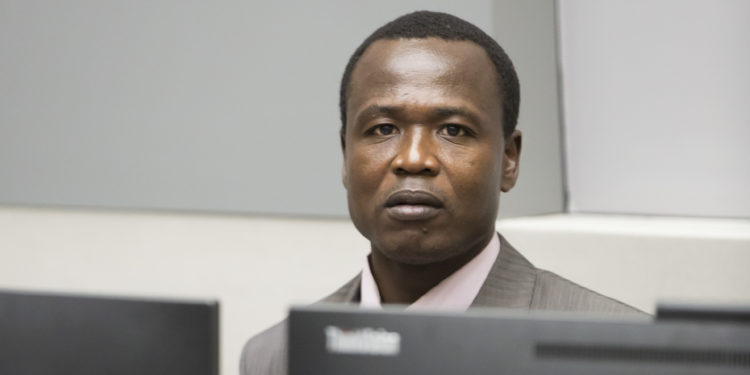By Kwamchetsi Makokha
Dominic Ongwen’s trial opening was briefly thrown into a tailspin after he declined to plead to 70 charges facing him at the International Criminal Court.
Judges were forced to take a short break to consider his answers, which included a claim that it was the Lord’s Resistance Army that committed atrocities rather than him. “I’m one of the people the LRA commited offences against. The LRA is Jospeh Kony,” he said as his lawyers argued that Ongwen suffers from mental disease and did not understand the charges against him.
Ongwen had been at large for 10 years since the ICC issued a warrant of arrest against him and four LRA commanders in 2005. Three of the commanders have been reported killed, and their leader, Joseph Kony, is still at large. Ongwen was handed over to the ICC in 2015 after he surrendered to United States forces in Central African Republic.
When the judges returned from their break, they ruled that they were “unpersuaded” that Ongwen was unfit to stand trial since he had understood them earlier at the confirmation hearings, and that he had obtained Acholi translations throughout. He understood the charges in January and he must understand them now, ruled Presideing Judge Bertram Schmitt who is stiing with Judges Peter Kovacs and Raul Cano Pangalangan.
Finally, Ongwen said in his Acholi mother tongue: “I am very happy because when I was brought here [at the International Criminal Court] for these reasons, I should have started by crying.
“In the name of God, I deny all these charges in respect of the war in Northern Uganda,” Ongwen added.
A plea of guilty or not guilty is the first step at the opening of ICC trials which is then followed by the prosecution summarising its case. Prosecutor Fatou Bensouda’s case focuses on four attacks in Pajule, Odek, Lukodi and Abok between October 2003 and June 2004, which affected 35,000 people.
“Dominic Ongwen became one of the most senior commanders in LRA between 2004 and 2005. He commanded a battalion, and was … subsequently promoted for his loyalty and ferocity,” she said.
She enumerated incidents in which Ongwen allegedly raped girls and forced them into marriage. Quoting one witness, the Prosecutor read out n court: “You are raped while you’re still young. Ongwen is the worst because he has sex with them when they are young.”
A particularly chilling episode relates to the testimony of a girl whom Ongwen allegedly summoned, demanded sex and raped multiple times before forcing her into marriage.
Throughout the proceedings, Ongwen sat listening intently to the Achli translation pouring into his earphones from the translaters, his beige suit and turquoise blue tie wrapping him.
The son of two schoolteachers took copious notes during the proceedings, not unlike a student in class.
Bensouda argued that although Joseph Kony knew that using children was unjustifiable, he had admitted it, saying, ‘That’s the way we recruit … as [Ugandan President Yoweri] Museveni was doing during his time in the bush.’
The trial is the first time the world is getting an opportunity to take a peek into the gruesome crimes committed in Uganda by one of the longest-surviving rebel groups. The prosecution is relying on radio communication, pictures and witness testimonies from former LRA soldiers and escaped abductees. Quoting Ongwen’s words on shortwave radio, Bensouda read out in court, ‘Starting to kill civilians seriously. Already deployed squads for atrocities and soon people will hear it on radio.”
Bensouda began demolishing one of the likely pillars of the Ongwen defence by aknowledging that people would feel horror at crimes committed but also sympathy for Ongwen, since he was abducted as a child and turned into a soldier.
“Cruel men can do kind things and kind men can do cruel things — 100 per cent consistency is not possible,” said Bensouda.
While acknowledging that Ongwen went through the trauma of separation from family and brutalisation at the hands of LRA, she added that his having suffered victimisation in the past was no justification to victimise others. “We will prove what he did, what he said, and the impact of what he did on his victims. The court is not to decide Ongwen’s goodness or badness, but his guilt,” she said.
Bensouda argued that Ongwen could have ordered his troops to lay down arms, or to defect like other LRA members who escaped, but he did not. She added that over 9,000 LRA members surrendered and received amnesty.
“Mr President, the evidence shows that Dominic Ongwen was a murderer and a rapist.”
She said that in February 2004, Ongwen reported to his superiors that he had attached Koch Ongago and burnt all houses. She added that he reported on the radio that he had attacked a church in Pajule; attacked camp at Lagille, burnt houses, and killed 20 civilians.
Some 4,000 victims are participating in the case.







